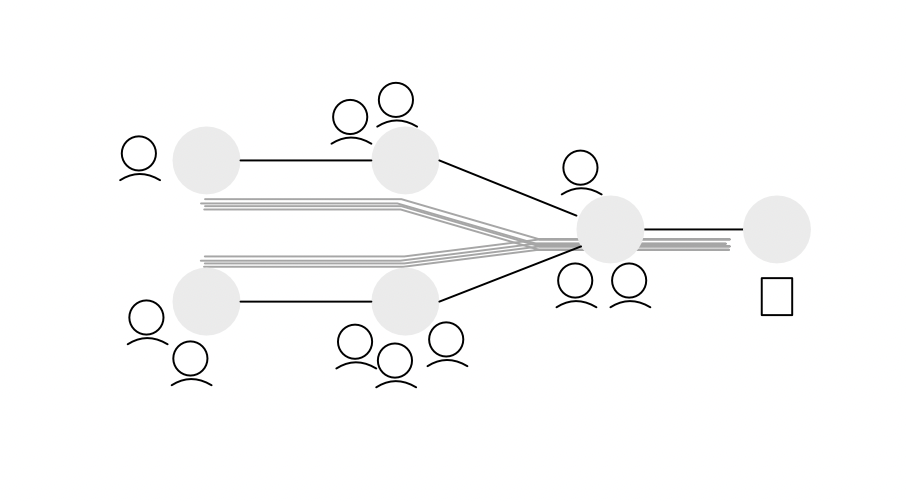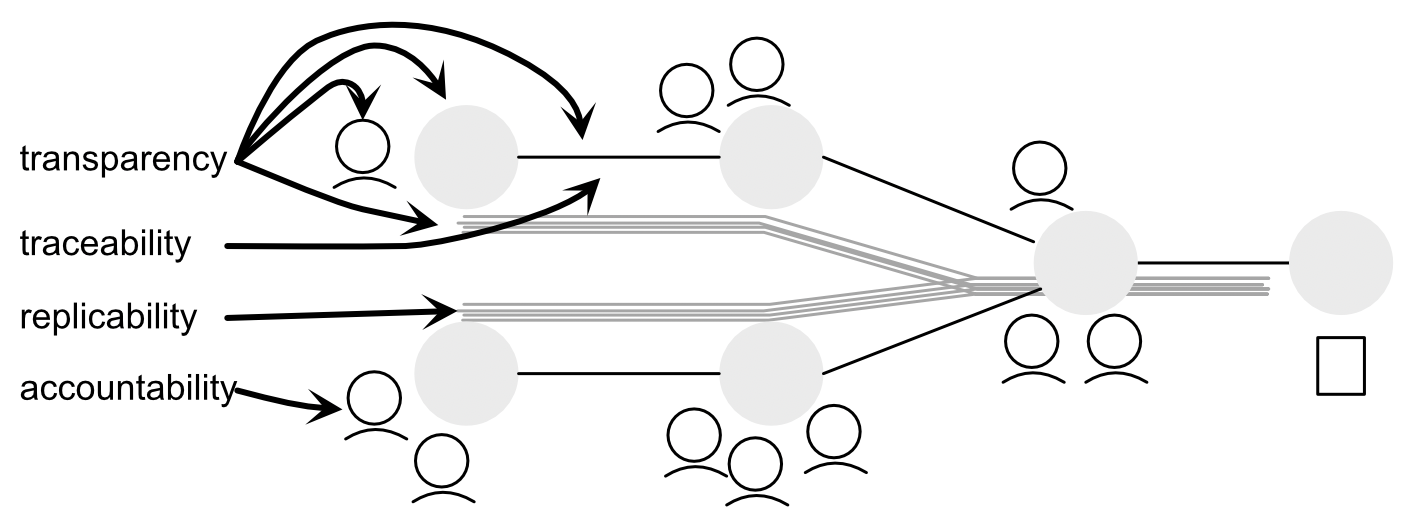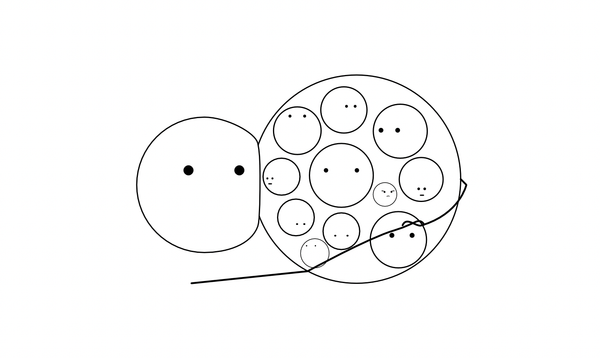Information literacy basic mechanics
Basic mechanics of information literacy explained: transparency, traceability, replicability, accountability.

Good information management is a promise to the future. Good information literacy is an earnest stance for integrity. The core mechanics that support information literacy are finite and easy to remember:
- Transparency into the logic, into the process, into how/if it was broken up into smaller pieces and social structures around completion;
- Traceability to be able to follow the information back through to (best case scenario) idea spark; also provides orientation in time;
- Replicability is a check/balance for the included information, and nods to potential behavioral and environmental adjacencies;
- Accountability is who was involved, with what, when, and how.
The differences between these can seem subtle. They are all, after all, variations on 'show your work'. But what they do is map what is known to be involved. That has the dual purpose of showing the work that went into it, and provide a starting point for how to troubleshoot when information falls apart.
- Transparency limits the phantom information pressure to what truly has unknown implication;
- Traceability focuses on the connections, providing a sense of information structure and higher-level process;
- Replicability provides a comparative environment to help figure out what might be different when things go amok;
- Accountability, because cognitive behavior and information are inextricably intertwingled, and information literacy is on a spectrum. AND: "accountability" is a loaded word, rife with hierarchical expectations; I prefer "who-ness" in my personal model.

This diagram is simplified. What goes on in those nodes can be very complex, add more people, and even increase depth and nuance to the information and processes. While those arrows pointing out where each shines are useful, the more nuanced reality is that all four are involved in every part of the functional diagram. Transparency has an arrow to node, connection, process, and people; in reality, they all do. What the mechanics assume is that there is information, process, and people involved. It also assumes that sooner or later mistakes will be fixed.
Roles with deeper information literacy training
There are roles that are dependent on information literacy that is deliberately and continuously folding in new information. Being one of these does not automatically mean that the individual is information literate. It does mean that they had exposure to the ideas, and where they have dismissed them there is a scent of willfulness.
Journalists
Journalism gets a special call out because some of the highest information literacy is in the news. Journalists often supplant personal accountability for their sources. We've also seen some distinct changes in the past decade where information literacy has been beaten down by information manipulation.
Good journalists can cite and modify their entire logical process, know their sources, and have worked hard to ascertain how the information hangs together and that there's not another, more rational way that it could. They aren't just taking their sources at face value, but checking the information mechanics and thinking models that account for behavior. Good journalists staking their reputation on an anonymous source is more impressive to me than mediocre journalists citing a known mediocre source.
This is why I try to pay more attention to the byline. I'm not perfect; I have been known to revert to news house (e.g., New York Times, Fox) to decide whether or not to give credence to news piece. The news house absolutely has standards that they live by, and impress those standards in ways that can heighten or diminish the journalists working in that house. The quality of journalistic integrity can similarly increase or diminish overall house standards – if it's not a stridently top-down cultural structure, which many of our institutions are moving to.
I cannot stress enough that individuals and institutions evolve. It takes time to build trust that good information management and literacy are used, consistently. It takes one big-enough mistake to lose trust. Always be on the lookout for new journalists.
Science
Science doesn't function without information literacy. It can be argued that we've become so good at tracing what goes into information literacy because of science. However, epistemology has been around longer than science.
The will for replicability in science – to be able to go into an information sphere that has a minor variable (like a different lab in a different country) and say with certainty that abc should produce x outcome – was a major breakthrough in information literacy.
The primary anti-pattern: politics
I almost decided not to go here; I cannot stress enough that it comes down to the individual, not the title. There can be politicians who have glugged at the information firehose, made sense, and are working towards a goal with integrity and honor.
The best politicians know their information, navigate it fully, and shift with the changing information substrate – which will be constant, because we're all making new sense all the time.
Because politicians are ostensibly thinking about big, complex pictures, there is a potential to obfuscate true goals, underlying cognitive biases, etc., that can make the goal label meaningless. Once that's meaningless, integrity and honor are also meaningless. Even if they are being honest with a core cohort, their willingness to put forth different narratives to different groups means that they are no longer working with information integrity.
Politicians' adherence to information literacy cannot be overstated for the health of our government and nation.
Some of the mediocre ones can founder due to the sheer quantity of information they are trying to make sense of. It shouldn't excuse them; if they can't manage the information scope, and can't develop a team to bridge that gap, they shouldn't be in office. Think about that they next time you vote for someone who rubber-stamped a bill along party lines, and tries to excuse the effects by saying they didn't read it and didn't understand that was in it.
For the ones who focus on manipulation, it's often because they really didn't look at the information. They have their narrative. They might cite some cherry-picked information that logics out to their narrative. Their focus is the narrative, and it's often telegraphed by behavioral manipulation.
This is where accountability is really, really important. By knowing the patterns of the person's information management, we get a sense of their adherence to information literacy.




